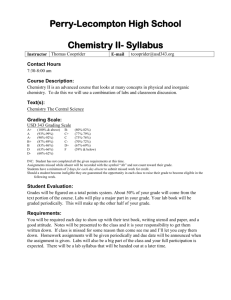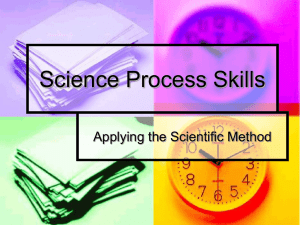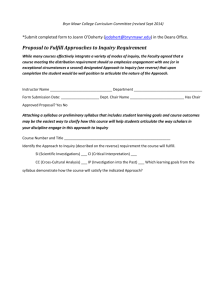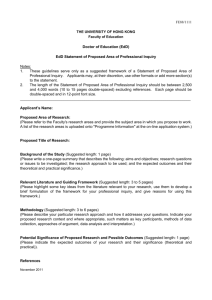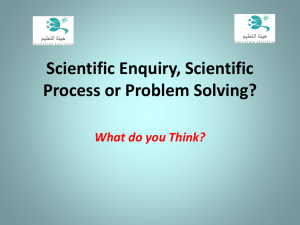Introduction to scientific collections and databases
advertisement
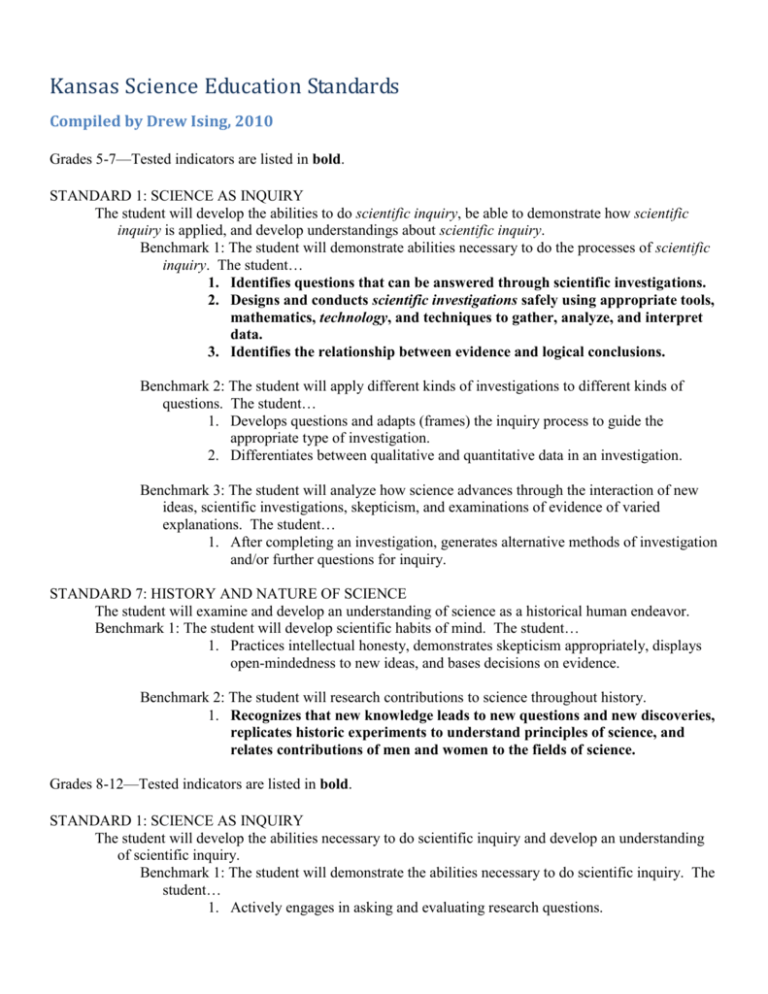
Kansas Science Education Standards Compiled by Drew Ising, 2010 Grades 5-7—Tested indicators are listed in bold. STANDARD 1: SCIENCE AS INQUIRY The student will develop the abilities to do scientific inquiry, be able to demonstrate how scientific inquiry is applied, and develop understandings about scientific inquiry. Benchmark 1: The student will demonstrate abilities necessary to do the processes of scientific inquiry. The student… 1. Identifies questions that can be answered through scientific investigations. 2. Designs and conducts scientific investigations safely using appropriate tools, mathematics, technology, and techniques to gather, analyze, and interpret data. 3. Identifies the relationship between evidence and logical conclusions. Benchmark 2: The student will apply different kinds of investigations to different kinds of questions. The student… 1. Develops questions and adapts (frames) the inquiry process to guide the appropriate type of investigation. 2. Differentiates between qualitative and quantitative data in an investigation. Benchmark 3: The student will analyze how science advances through the interaction of new ideas, scientific investigations, skepticism, and examinations of evidence of varied explanations. The student… 1. After completing an investigation, generates alternative methods of investigation and/or further questions for inquiry. STANDARD 7: HISTORY AND NATURE OF SCIENCE The student will examine and develop an understanding of science as a historical human endeavor. Benchmark 1: The student will develop scientific habits of mind. The student… 1. Practices intellectual honesty, demonstrates skepticism appropriately, displays open-mindedness to new ideas, and bases decisions on evidence. Benchmark 2: The student will research contributions to science throughout history. 1. Recognizes that new knowledge leads to new questions and new discoveries, replicates historic experiments to understand principles of science, and relates contributions of men and women to the fields of science. Grades 8-12—Tested indicators are listed in bold. STANDARD 1: SCIENCE AS INQUIRY The student will develop the abilities necessary to do scientific inquiry and develop an understanding of scientific inquiry. Benchmark 1: The student will demonstrate the abilities necessary to do scientific inquiry. The student… 1. Actively engages in asking and evaluating research questions. 2. Actively engages in investigations, including developing questions, gathering and analyzing data, and designing and conducting research 3. Actively engages in using technological tools and mathematics in their own scientific investigations. 4. Actively engages in conducting an inquiry, formulating and revising his or her scientific explanations and models (physical, conceptual, or mathematical) using logic and evidence, and recognizing that potential alternative explanations and models should be considered. 5. Actively engages in communicating and defending the design, results, and conclusion of his/her investigation. STANDARD 5: SCIENCE AND TECHNOLOGY The student will develop understandings about the relationship between science and technology. Benchmark 1: The student will develop an understanding that technology is applied science. The student… 1. Understands technology is the application of scientific knowledge for functional purposes. 2. Understands creativity, imagination, and a broad scientific knowledge base are required to produce useful results. 3. Understands science advances new technologies. New technologies open new areas for scientific inquiry. STANDARD 7: HISTORY AND NATURE OF SCIENCE The student will develop understanding of science as a human endeavor, the nature of scientific knowledge, and historical perspectives. Benchmark 1: The student will develop an understanding that science is a human endeavor that uses models to describe and explain the physical universe. The student… 1. Demonstrates an understanding of science as both vocation and avocation. 2. Explains how science uses peer review, replication of methods, and norms of honesty. 6. Recognizes society’s role in supporting topics of research and determining institutions where research is conducted. Benchmark 2: The student will develop an understanding of the nature of scientific knowledge. The student… 1. Understands scientific knowledge describes and explains the physical world in terms of matter, energy, and forces. Scientific knowledge is provisional and is subject to change as new evidence becomes available. 2. Understands scientific knowledge begins with empirical observations, which are the data (also called facts or evidence) upon which further scientific knowledge is built. 3. Understands scientific knowledge consists of hypotheses, inferences, laws, and theories. 4. Understands a testable hypothesis or inference must be subject to confirmation by empirical evidence


